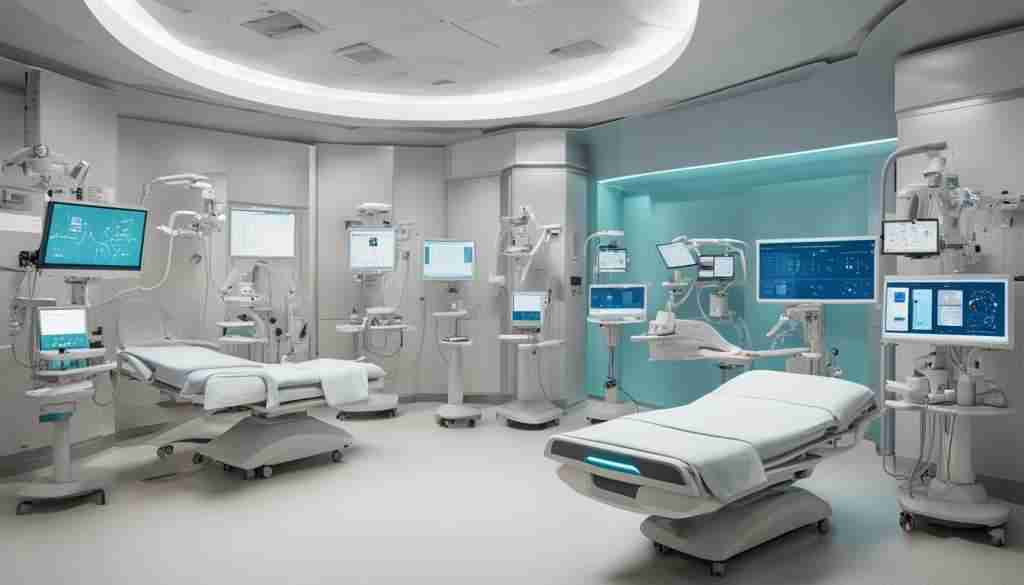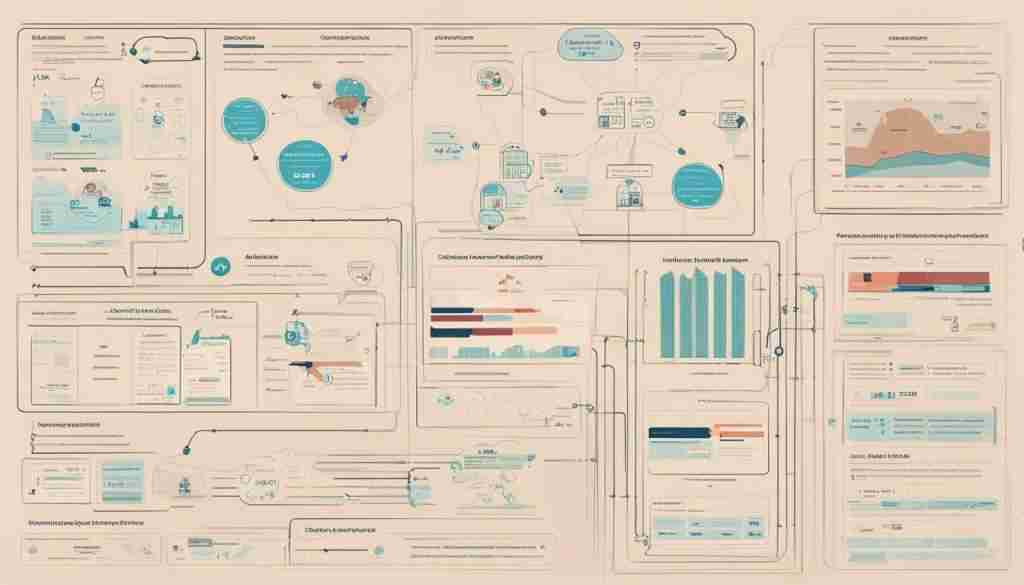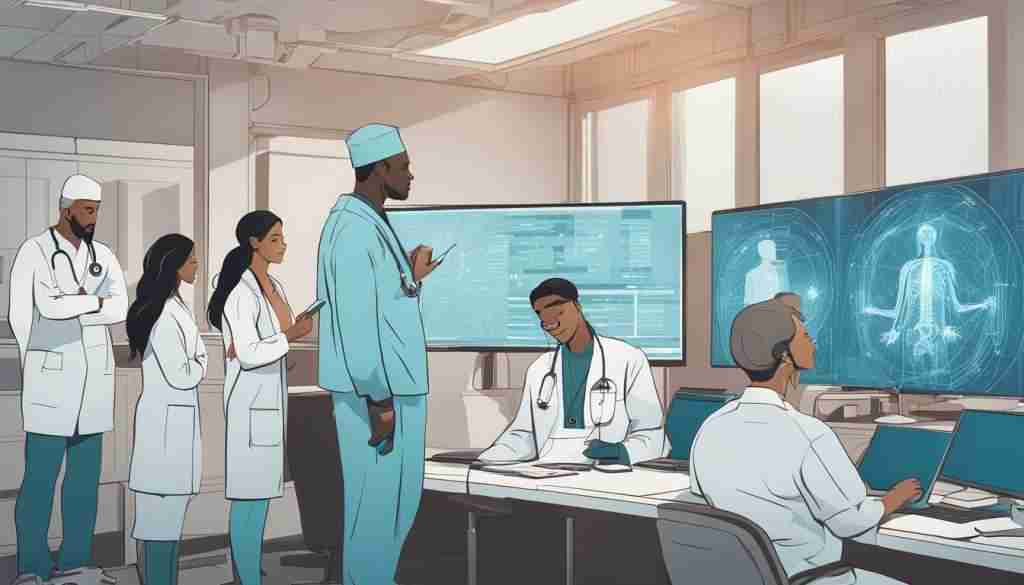Artificial intelligence (AI) has the potential to revolutionize healthcare delivery as we know it. With the use of AI algorithms in healthcare, medical practices are transforming, improving patient care, and enhancing treatment outcomes. These algorithms are becoming increasingly prevalent in the healthcare industry and are playing an integral role in enabling data-driven decision-making.
The use of AI algorithms in healthcare delivery is driving advancements in areas such as diagnostics, personalized medicine, and virtual care. The benefits are numerous, from improved healthcare outcomes to enhanced patient satisfaction. It is clear that AI algorithms have opened up numerous opportunities to modernize the healthcare industry and improve patient care.
Key Takeaways:
- AI algorithms are transforming medical practices and improving patient care in healthcare delivery.
- The use of AI-powered algorithms is driving advancements in areas such as diagnostics, personalized medicine, and virtual care.
- The benefits of AI algorithms include improved healthcare outcomes and enhanced patient satisfaction.
Enhancing Patient Care with AI-Based Algorithms in Healthcare Delivery
The use of AI-based algorithms in healthcare has enabled a significant improvement in the quality of care provided to patients. These algorithms have revolutionized the way healthcare delivery is approached and have made it possible to develop personalized healthcare algorithms for improved delivery.
AI algorithms have made it possible for healthcare providers to analyze large volumes of data and identify patterns that can be used to improve patient outcomes. These algorithms are specifically designed to learn from the data they analyze and to make accurate predictions about patient care.
One of the key benefits of AI-based algorithms in healthcare delivery is the ability to provide personalized care to patients. By analyzing patient data, AI algorithms can create individualized treatment plans that are tailored to each patient’s unique needs. This can result in faster recovery times and better outcomes for patients.
Another advantage of AI algorithms is their ability to streamline processes and reduce administrative burden. They can help automate routine tasks such as scheduling appointments and managing billing, allowing healthcare providers to focus on providing high-quality care.
Overall, the use of AI-based algorithms in healthcare delivery has transformed medical practices and has led to significant improvements in patient care. As the healthcare industry continues to evolve, it is clear that AI algorithms will play an increasingly important role in shaping the future of healthcare delivery.

Transforming Medical Practices with Machine Learning Algorithms
Machine learning algorithms have the potential to transform medical practices and improve patient outcomes. These algorithms are capable of analyzing vast amounts of medical data to identify patterns, predict outcomes, and make accurate diagnoses. By enabling data-driven decision-making, machine learning algorithms are revolutionizing healthcare delivery.
Predictive algorithms are one of the most promising applications of machine learning in healthcare. These algorithms use historical patient data to predict future outcomes and help clinicians make informed decisions about patient care. For example, predictive algorithms can be used to identify patients who are at high risk for developing chronic diseases, allowing healthcare providers to initiate preventive measures and improve overall health outcomes.
One area where machine learning algorithms are already having a significant impact is in medical imaging. These algorithms can analyze medical images to identify structures, detect abnormalities, and make diagnoses. Computer-aided detection (CAD) systems, which use machine learning algorithms to analyze medical images, have been shown to improve the accuracy of mammography, helping to detect breast cancer at an early stage.
Another promising application of machine learning algorithms is in personalized medicine. By analyzing a patient’s genetic data, machine learning algorithms can identify genetic mutations that may cause or contribute to disease. This information can be used to develop personalized treatment plans that target the underlying cause of the disease.
Despite the many benefits of machine learning algorithms in healthcare, there are also challenges that need to be addressed. One of the biggest challenges is ensuring the ethical use of these algorithms. There is a risk that these algorithms may perpetuate bias or discriminate against certain groups of patients. Healthcare providers must ensure that machine learning algorithms are transparent and accountable, and that they are used in a way that promotes equitable healthcare delivery.

“Machine learning algorithms have the potential to transform medical practices and improve patient outcomes.”
Overall, machine learning algorithms are transforming healthcare delivery by enabling data-driven decision-making and improving patient outcomes. The use of predictive algorithms in healthcare is just one way in which these algorithms are being applied to improve medical practices. While there are challenges that need to be addressed, the potential of machine learning in healthcare is vast, and we are only just beginning to scratch the surface of what is possible.
Bringing Innovations to Life: AI-Powered Healthcare Algorithms
AI-powered algorithms are revolutionizing the healthcare industry by bringing innovative solutions to life. These algorithm-driven healthcare solutions are driving advancements in diagnostics, personalized medicine, and virtual care. With the help of AI-powered algorithms, medical professionals can analyze massive amounts of data to make informed decisions about patient care.
One area where AI-powered algorithms are making a significant impact is in diagnostic imaging. Algorithms are improving the accuracy and speed of medical imaging, allowing doctors to make more accurate diagnoses and develop more effective treatment plans.
Another area where AI-powered algorithms are making a big difference is in personalized medicine. By analyzing a patient’s genetic data, algorithms can help doctors develop personalized treatment plans that are tailored to the patient’s unique needs.
Virtual care is another area where AI-powered algorithms are driving innovation. With the help of algorithms, medical professionals can monitor patients remotely, allowing for more frequent and accurate monitoring of vital signs and other health indicators. This can help to improve patient outcomes, reduce healthcare costs, and provide better overall care.
As AI-powered algorithms continue to evolve, they are expected to play an even larger role in the healthcare industry. From improving patient care to driving innovation, these algorithms have the potential to transform the way healthcare is delivered. By embracing algorithm-driven healthcare solutions and investing in AI-powered technologies, the healthcare industry can continue to make strides in improving patient outcomes and delivering better care to patients.

Overcoming Challenges and Ensuring Ethical Use of AI Algorithms in Healthcare Delivery
The use of AI algorithms in healthcare delivery brings about numerous advantages, ranging from improved quality of care to better patient outcomes. However, there are ethical considerations that must be addressed to ensure the responsible use of these algorithms. One such challenge is the issue of data privacy. Healthcare providers must prioritize the protection of patient data and ensure that any AI algorithm used adheres to regulations and guidelines.
Bias is another challenge that needs to be addressed in the ethical use of AI algorithms in healthcare delivery. To ensure equitable and unbiased healthcare, it is essential to develop algorithms that are not discriminatory. This requires careful consideration of how data is collected and analyzed, as well as the design of the algorithm itself.
Healthcare providers have a responsibility to ensure the ethical use of AI algorithms in patient care. Transparency and accountability are vital to building trust with patients and promoting responsible use of these technologies. Providers must be open about the use of AI algorithms and explain how they are being used to improve patient care.
Regulatory frameworks are critical in ensuring the responsible use of AI algorithms in healthcare delivery. Guidelines and standards must be established to govern the development and use of these algorithms. This includes oversight of the algorithm’s design, implementation, and evaluation. Ultimately, the ethical use of AI algorithms in healthcare delivery is not only necessary, but it also plays a crucial role in promoting patient-centered care.

Conclusion
AI algorithms have the potential to revolutionize healthcare delivery by improving patient care and transforming medical practices. By using AI-based and machine learning algorithms, healthcare providers can make data-driven decisions that lead to better patient outcomes and higher levels of patient satisfaction. Furthermore, the adoption of AI-powered healthcare solutions can drive innovation in areas such as diagnostics, personalized medicine, and virtual care.
However, the adoption of AI algorithms in healthcare delivery also poses challenges and ethical considerations that must be addressed. Healthcare providers must ensure the ethical use of these algorithms by addressing issues such as data privacy, bias, and regulatory frameworks. Transparency and accountability are critical in the adoption of algorithm-driven healthcare solutions to ensure that their benefits are fully realized while minimizing potential risks.
Looking to the Future
As the healthcare industry continues to evolve, the use of AI algorithms in healthcare delivery will become even more critical. With ongoing advancements in technology and data analytics, healthcare providers will be able to use predictive algorithms to identify patterns and make accurate predictions in patient care. The result will be improved patient outcomes, higher levels of patient satisfaction, and a more efficient healthcare system.
While addressing challenges and ensuring ethical use must remain a priority, the potential benefits that AI algorithms can bring to healthcare delivery are vast. As such, continued investment in AI-powered healthcare solutions is crucial, and healthcare providers and policymakers must seek to harness this transformative potential for the betterment of patient care and medical practices.
FAQ
Q: What are AI algorithms in healthcare delivery?
A: AI algorithms in healthcare delivery are computer programs that use artificial intelligence techniques to analyze medical data and assist healthcare providers in making informed decisions about patient care.
Q: How are AI algorithms revolutionizing medicine?
A: AI algorithms are revolutionizing medicine by improving the efficiency and accuracy of healthcare delivery. They can analyze large amounts of data quickly, identify patterns, and provide personalized treatment recommendations.
Q: What are the benefits of using AI algorithms in healthcare delivery?
A: The benefits of using AI algorithms in healthcare delivery include improved patient outcomes, increased efficiency in diagnosing and treating diseases, enhanced patient experience, and cost savings for healthcare providers.
Q: How are AI algorithms enhancing patient care?
A: AI algorithms are enhancing patient care by helping healthcare providers track and monitor patients’ health conditions, predicting disease progression, and assisting in treatment planning. They also support remote patient monitoring and telemedicine.
Q: How do machine learning algorithms transform medical practices?
A: Machine learning algorithms transform medical practices by analyzing large datasets, identifying patterns, and making accurate predictions. They enable personalized medicine, help in early disease detection, and support clinical decision-making.
Q: What innovations do AI-powered healthcare algorithms bring?
A: AI-powered healthcare algorithms bring innovations in areas such as diagnostics, personalized medicine, and virtual care. They enable faster and more accurate diagnosis, personalized treatment plans, and remote patient monitoring.
Q: What are the challenges and ethical considerations of using AI algorithms in healthcare delivery?
A: Challenges and ethical considerations of using AI algorithms in healthcare delivery include ensuring data privacy, mitigating bias in algorithms, and maintaining transparency and accountability in their use. Regulatory frameworks are necessary to ensure ethical adoption.

Artificial intelligence (AI) has the potential to revolutionize healthcare delivery as we know it. With the use of AI algorithms in healthcare, medical practices are transforming, improving patient care, and enhancing treatment outcomes. These algorithms are becoming increasingly prevalent in the healthcare industry and are playing an integral role in enabling data-driven decision-making.
The use of AI algorithms in healthcare delivery is driving advancements in areas such as diagnostics, personalized medicine, and virtual care. The benefits are numerous, from improved healthcare outcomes to enhanced patient satisfaction. It is clear that AI algorithms have opened up numerous opportunities to modernize the healthcare industry and improve patient care.
Key Takeaways:
- AI algorithms are transforming medical practices and improving patient care in healthcare delivery.
- The use of AI-powered algorithms is driving advancements in areas such as diagnostics, personalized medicine, and virtual care.
- The benefits of AI algorithms include improved healthcare outcomes and enhanced patient satisfaction.
Enhancing Patient Care with AI-Based Algorithms in Healthcare Delivery
The use of AI-based algorithms in healthcare has enabled a significant improvement in the quality of care provided to patients. These algorithms have revolutionized the way healthcare delivery is approached and have made it possible to develop personalized healthcare algorithms for improved delivery.
AI algorithms have made it possible for healthcare providers to analyze large volumes of data and identify patterns that can be used to improve patient outcomes. These algorithms are specifically designed to learn from the data they analyze and to make accurate predictions about patient care.
One of the key benefits of AI-based algorithms in healthcare delivery is the ability to provide personalized care to patients. By analyzing patient data, AI algorithms can create individualized treatment plans that are tailored to each patient’s unique needs. This can result in faster recovery times and better outcomes for patients.
Another advantage of AI algorithms is their ability to streamline processes and reduce administrative burden. They can help automate routine tasks such as scheduling appointments and managing billing, allowing healthcare providers to focus on providing high-quality care.
Overall, the use of AI-based algorithms in healthcare delivery has transformed medical practices and has led to significant improvements in patient care. As the healthcare industry continues to evolve, it is clear that AI algorithms will play an increasingly important role in shaping the future of healthcare delivery.

Transforming Medical Practices with Machine Learning Algorithms
Machine learning algorithms have the potential to transform medical practices and improve patient outcomes. These algorithms are capable of analyzing vast amounts of medical data to identify patterns, predict outcomes, and make accurate diagnoses. By enabling data-driven decision-making, machine learning algorithms are revolutionizing healthcare delivery.
Predictive algorithms are one of the most promising applications of machine learning in healthcare. These algorithms use historical patient data to predict future outcomes and help clinicians make informed decisions about patient care. For example, predictive algorithms can be used to identify patients who are at high risk for developing chronic diseases, allowing healthcare providers to initiate preventive measures and improve overall health outcomes.
One area where machine learning algorithms are already having a significant impact is in medical imaging. These algorithms can analyze medical images to identify structures, detect abnormalities, and make diagnoses. Computer-aided detection (CAD) systems, which use machine learning algorithms to analyze medical images, have been shown to improve the accuracy of mammography, helping to detect breast cancer at an early stage.
Another promising application of machine learning algorithms is in personalized medicine. By analyzing a patient’s genetic data, machine learning algorithms can identify genetic mutations that may cause or contribute to disease. This information can be used to develop personalized treatment plans that target the underlying cause of the disease.
Despite the many benefits of machine learning algorithms in healthcare, there are also challenges that need to be addressed. One of the biggest challenges is ensuring the ethical use of these algorithms. There is a risk that these algorithms may perpetuate bias or discriminate against certain groups of patients. Healthcare providers must ensure that machine learning algorithms are transparent and accountable, and that they are used in a way that promotes equitable healthcare delivery.

“Machine learning algorithms have the potential to transform medical practices and improve patient outcomes.”
Overall, machine learning algorithms are transforming healthcare delivery by enabling data-driven decision-making and improving patient outcomes. The use of predictive algorithms in healthcare is just one way in which these algorithms are being applied to improve medical practices. While there are challenges that need to be addressed, the potential of machine learning in healthcare is vast, and we are only just beginning to scratch the surface of what is possible.
Bringing Innovations to Life: AI-Powered Healthcare Algorithms
AI-powered algorithms are revolutionizing the healthcare industry by bringing innovative solutions to life. These algorithm-driven healthcare solutions are driving advancements in diagnostics, personalized medicine, and virtual care. With the help of AI-powered algorithms, medical professionals can analyze massive amounts of data to make informed decisions about patient care.
One area where AI-powered algorithms are making a significant impact is in diagnostic imaging. Algorithms are improving the accuracy and speed of medical imaging, allowing doctors to make more accurate diagnoses and develop more effective treatment plans.
Another area where AI-powered algorithms are making a big difference is in personalized medicine. By analyzing a patient’s genetic data, algorithms can help doctors develop personalized treatment plans that are tailored to the patient’s unique needs.
Virtual care is another area where AI-powered algorithms are driving innovation. With the help of algorithms, medical professionals can monitor patients remotely, allowing for more frequent and accurate monitoring of vital signs and other health indicators. This can help to improve patient outcomes, reduce healthcare costs, and provide better overall care.
As AI-powered algorithms continue to evolve, they are expected to play an even larger role in the healthcare industry. From improving patient care to driving innovation, these algorithms have the potential to transform the way healthcare is delivered. By embracing algorithm-driven healthcare solutions and investing in AI-powered technologies, the healthcare industry can continue to make strides in improving patient outcomes and delivering better care to patients.

Overcoming Challenges and Ensuring Ethical Use of AI Algorithms in Healthcare Delivery
The use of AI algorithms in healthcare delivery brings about numerous advantages, ranging from improved quality of care to better patient outcomes. However, there are ethical considerations that must be addressed to ensure the responsible use of these algorithms. One such challenge is the issue of data privacy. Healthcare providers must prioritize the protection of patient data and ensure that any AI algorithm used adheres to regulations and guidelines.
Bias is another challenge that needs to be addressed in the ethical use of AI algorithms in healthcare delivery. To ensure equitable and unbiased healthcare, it is essential to develop algorithms that are not discriminatory. This requires careful consideration of how data is collected and analyzed, as well as the design of the algorithm itself.
Healthcare providers have a responsibility to ensure the ethical use of AI algorithms in patient care. Transparency and accountability are vital to building trust with patients and promoting responsible use of these technologies. Providers must be open about the use of AI algorithms and explain how they are being used to improve patient care.
Regulatory frameworks are critical in ensuring the responsible use of AI algorithms in healthcare delivery. Guidelines and standards must be established to govern the development and use of these algorithms. This includes oversight of the algorithm’s design, implementation, and evaluation. Ultimately, the ethical use of AI algorithms in healthcare delivery is not only necessary, but it also plays a crucial role in promoting patient-centered care.

Conclusion
AI algorithms have the potential to revolutionize healthcare delivery by improving patient care and transforming medical practices. By using AI-based and machine learning algorithms, healthcare providers can make data-driven decisions that lead to better patient outcomes and higher levels of patient satisfaction. Furthermore, the adoption of AI-powered healthcare solutions can drive innovation in areas such as diagnostics, personalized medicine, and virtual care.
However, the adoption of AI algorithms in healthcare delivery also poses challenges and ethical considerations that must be addressed. Healthcare providers must ensure the ethical use of these algorithms by addressing issues such as data privacy, bias, and regulatory frameworks. Transparency and accountability are critical in the adoption of algorithm-driven healthcare solutions to ensure that their benefits are fully realized while minimizing potential risks.
Looking to the Future
As the healthcare industry continues to evolve, the use of AI algorithms in healthcare delivery will become even more critical. With ongoing advancements in technology and data analytics, healthcare providers will be able to use predictive algorithms to identify patterns and make accurate predictions in patient care. The result will be improved patient outcomes, higher levels of patient satisfaction, and a more efficient healthcare system.
While addressing challenges and ensuring ethical use must remain a priority, the potential benefits that AI algorithms can bring to healthcare delivery are vast. As such, continued investment in AI-powered healthcare solutions is crucial, and healthcare providers and policymakers must seek to harness this transformative potential for the betterment of patient care and medical practices.
FAQ
Q: What are AI algorithms in healthcare delivery?
A: AI algorithms in healthcare delivery are computer programs that use artificial intelligence techniques to analyze medical data and assist healthcare providers in making informed decisions about patient care.
Q: How are AI algorithms revolutionizing medicine?
A: AI algorithms are revolutionizing medicine by improving the efficiency and accuracy of healthcare delivery. They can analyze large amounts of data quickly, identify patterns, and provide personalized treatment recommendations.
Q: What are the benefits of using AI algorithms in healthcare delivery?
A: The benefits of using AI algorithms in healthcare delivery include improved patient outcomes, increased efficiency in diagnosing and treating diseases, enhanced patient experience, and cost savings for healthcare providers.
Q: How are AI algorithms enhancing patient care?
A: AI algorithms are enhancing patient care by helping healthcare providers track and monitor patients’ health conditions, predicting disease progression, and assisting in treatment planning. They also support remote patient monitoring and telemedicine.
Q: How do machine learning algorithms transform medical practices?
A: Machine learning algorithms transform medical practices by analyzing large datasets, identifying patterns, and making accurate predictions. They enable personalized medicine, help in early disease detection, and support clinical decision-making.
Q: What innovations do AI-powered healthcare algorithms bring?
A: AI-powered healthcare algorithms bring innovations in areas such as diagnostics, personalized medicine, and virtual care. They enable faster and more accurate diagnosis, personalized treatment plans, and remote patient monitoring.
Q: What are the challenges and ethical considerations of using AI algorithms in healthcare delivery?
A: Challenges and ethical considerations of using AI algorithms in healthcare delivery include ensuring data privacy, mitigating bias in algorithms, and maintaining transparency and accountability in their use. Regulatory frameworks are necessary to ensure ethical adoption.



